On a Friday afternoon, a group of 11 and 12-year-olds from Beit Shemesh arrive at the grassy area near the entrance to Moshav Mesilat Zion. Their sharp new baseball uniforms contrast with the makeshift field marked with four simple bases and a homemade backstop. With no real infield or pitcher’s mound and only bushes to stop a well-hit ball from leaving the area, it’s not the greatest setting to prepare the next generation of Olympic-level athletes.
Still, the Israel Association of Baseball (IAB) is swinging for the fences, looking to build on the performance of the Israeli Olympic team at its maiden competition in 2021. The organization plans to send an unprecedented four youth teams to European competitions this summer; it is also organizing another Team Israel for the World Baseball Classic (WBC) in March 2023. Like the Olympic team — which had only four Israeli-born players — the WBC team will consist mostly of American Jews.
Working tirelessly without a full-time staff, IAB president Jordy Alter runs the organization with the help of a crew of dedicated volunteers. Baseball is clearly a labor of love: Alter makes the journey back to his native New Jersey each month to manage his private dental practice.
But as baseball continues to grow in Israel, the 59-year-old Alter wants to ensure that players will have state-of-the-art facilities in which to play. The JNF-sponsored Ezra Schwartz Memorial Baseball Field — Israel’s second regulation-sized field — opened late last year in Ra’anana. Meanwhile, Alter is overseeing the construction of another JNF project — a baseball complex in Beit Shemesh that will include a regulation field along with two smaller ones for younger players. Construction is expected to be completed in 2023.
Standing on the site of the future home plate, Alter told The Times of Israel that “the facility will be the centerpiece of baseball in Israel” and will impact not just the growth of the sport here, but also its ability to host international tournaments.
Last year at the 2020 Tokyo Olympics (played in July 2021 due to the pandemic), Israel baseball found its time to shine. Fans at home and across the Diaspora proudly rooted for Team Israel, which played valiantly but ultimately failed to win a medal. The long and costly effort to qualify for and play in the Olympics paid off with extensive exposure on the global stage.
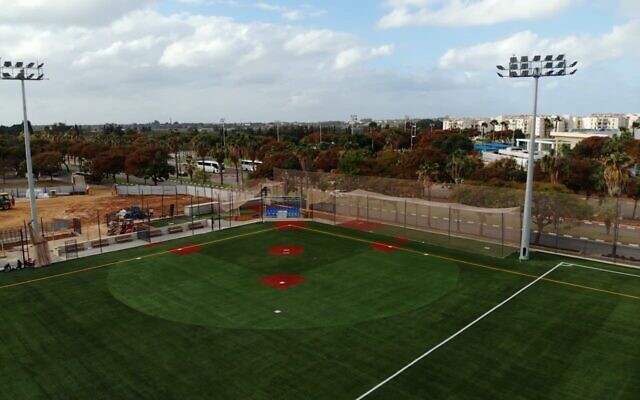
The Ezra Schwartz Memorial Field in Ra’anana. (Courtesy Israel Association of Baseball)
Immediately after the Olympics, though, the IAB had to transition from focusing on Tokyo to rebuilding baseball in Israel. Due to COVID restrictions, the number of players registered nationwide dropped by half from 800 to 400. League activities were severely curtailed. Players in leagues across the country lost an entire season.
But the IAB points to success — and hope for the future of native Israeli Olympic-level players — in examples such as 33-year-old Alon Leichman. Now retired from playing, Leichman is a pitching coach for the Tacoma Rainiers, a Minor League Triple-A affiliate of Major League Baseball’s Seattle Mariners. Leichman was born and raised in Kibbutz Gezer in the country’s center.
A Sabra raised on the field of dreams
Literally carved out of a cornfield on Leichman’s kibbutz, Israel’s first baseball field was built by immigrants from the United States in the early 1970s. Leichman grew up with the “field of dreams” in his backyard, and is now perhaps Israel’s best example of a homegrown baseball professional.
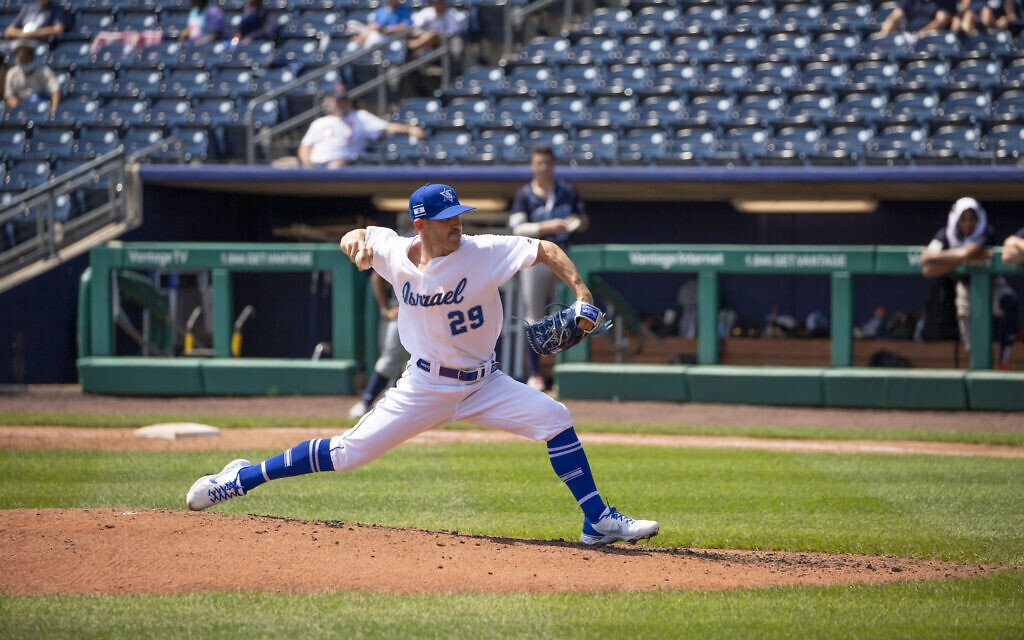
Alon Leichman pitching for Team Israel in this undated photo. (Courtesy IAB)
Leichman had a successful pitching stint with the University of California San Diego Tritons. He went on to play for and coach Team Israel at the 2017 World Baseball Classic, at the Olympic qualifiers, and at the Tokyo Olympics.
“I had the advantage of literally growing up next to Israel’s first real baseball and softball field,” Leichman said. “It was the only place in Israel where baseball was around all the time. My father was a softball pitcher and I was coached and received a good enough foundation to play college baseball.”
I had the advantage of literally growing up next to Israel’s first real baseball and softball field
While multiple elbow injuries ended his dream of playing in the majors, Leichman says “coaching in the big leagues is the next best thing.” Leichman visits Kibbutz Gezer every off-season and plans to eventually return to Israel.
“I want to help raise the level of play in Israel to help the future generation of players reach their dreams and goals,” he said, adding, “It was great to have the Americans play with us, but very hard for the talented Israeli players who did not make the team.”
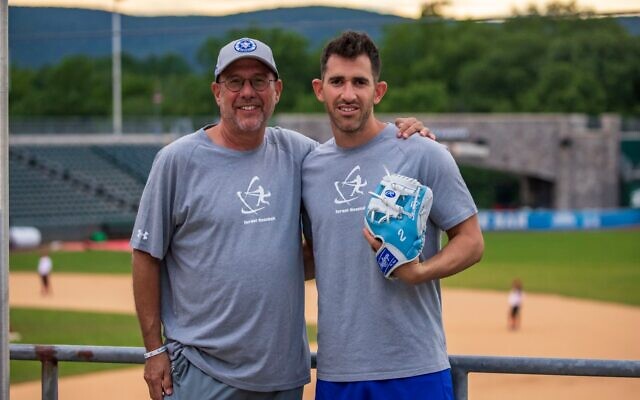
Former Israel Association of Baseball president Peter Kurz, left, with Alon Leichman. (Courtesy IAB)
An unlikely Olympic trajectory
Going to bat for Israel baseball along with Alter is Peter Kurz, Alter’s predecessor as IAB president who plotted the unlikely road to Olympic qualification. After guiding the IAB for eight years, Kurz became full-time general manager of the Olympic and national teams.
In the years before the Olympic run, Kurz, 64, had developed contacts in Major League Baseball, the minor leagues, and college baseball to recruit the best possible team of American Jewish players. Very few Israeli players were ready for the big stage. In 2012 and 2017 Team Israel competed in WBC qualifiers. In the latter contest, the team won a regional qualifying round played in Brooklyn in 2016, reaching the second round of the main event in Tokyo and finishing sixth out of 16 teams overall.
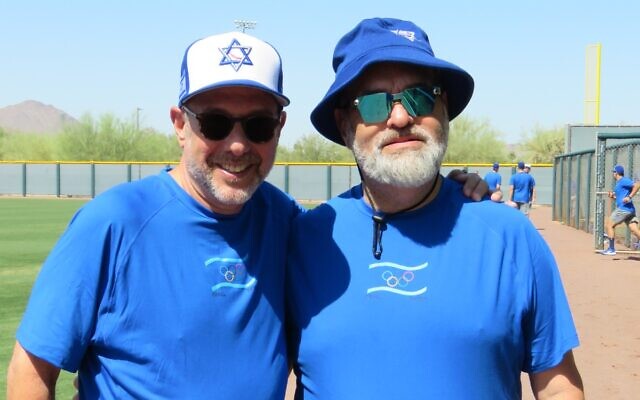
Former and current Israel Association of Baseball presidents Peter Kurz, left, and Jordy Alter. (Courtesy IAB)
It was even more challenging to put a team together for the Olympics, where players are required to make the commitment to be citizens of the country they represent. As they moved toward Olympic qualification, the American players were all granted Israeli citizenship — though they had visited but had never lived in the country.
The Israeli Olympic team put together by Kurz included a top coaching staff and a spirited and talented group of professional or recently retired athletes, including former MLB stars Ian Kinsler and Danny Valencia.
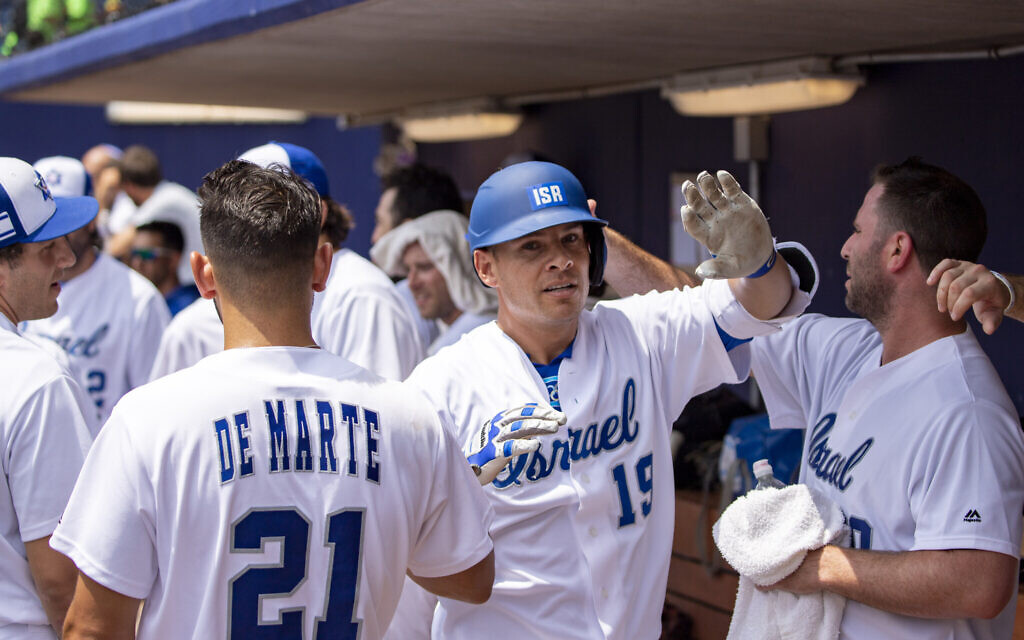
Team Israel’s Danny Valencia high-fives teammates in this undated photo. (Courtesy IAB)
Most of the team are now out of baseball and doing other things, and Kurz is putting together a new team made up primarily of American Jews to compete in the WBC in March. Israel heads into the tournament ranked 6th in the world.
A repeat Team Israel Olympic appearance is a long way off, though. Baseball is not a permanent Olympic sport. There will be no baseball in the 2024 Paris Olympics and a decision on whether to include baseball in the Los Angeles Olympic Games in 2028 has yet to be determined by the International Olympic Committee.
Kurz said that baseball’s non-inclusion in the 2024 Olympics “means considerably less government support… From a financial point of view, it’s a big difference.”
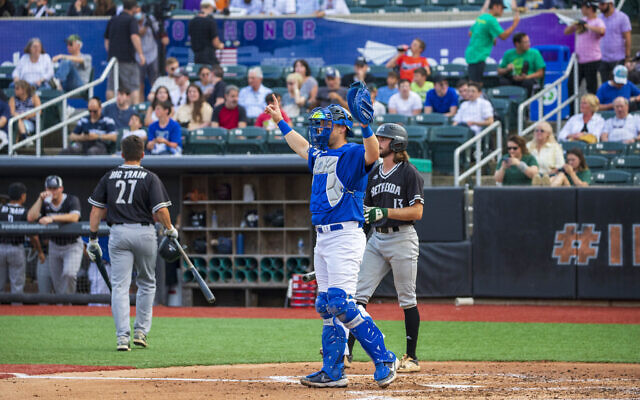
Catcher Ryan Lavarnway playing for Team Israel in this undated photo. (Courtesy IAB)
“If we qualify for the WBC or the Olympics it means a lot of funding and tremendous impetus for the sport locally,” he added.
Nurture the home-grown talent
IAB leadership all say that the goal is for Israeli-born players to become good enough to replace American Jewish players on the roster. The challenge of bringing them up to top international standards falls to IAB head coaches Nate Fish and Ophir Katz.
Fish, 42, is a former IAB executive director who officially immigrated to Israel in 2013 before moving back to the US in 2016 to develop a startup. Though he lives abroad, Fish continues to make regular trips to Israel and joins the team as manager. Israeli-born Ophir Katz heads the 100-player strong Israel Baseball Academy operated at the Baptist Village in Petach Tikva.
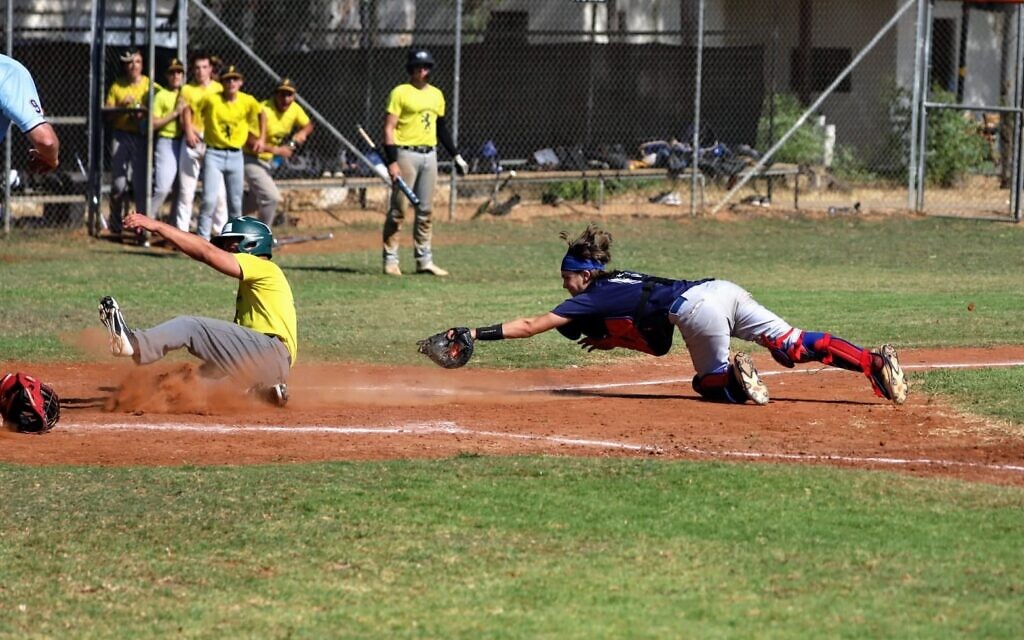
Israeli youth play in a juniors game in this undated photo. (Courtesy IAB)
Under the guidance of Fish and Katz, an unprecedented four Israeli youth baseball teams will travel to European championships and qualifying tournaments this summer in the U12, U15, U18, and U23 age groups (the “U” stands for “under”). There have been few opportunities for local baseball fans to see Team Israel U18 in action, however, they are to play at the Maccabiah Games this July when Israel hosts games against teams from Canada and the US.
Most players filling the 15- to 25-player rosters learned the game at the Israel Baseball Academy. Katz told The Times of Israel that if baseball is in the Olympics in 2028, he expects that up to half of the team could be made up of players who travel to Israel this summer to attend the academy.
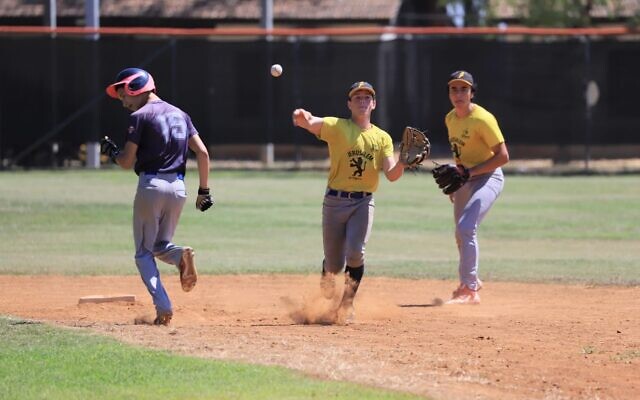
Israeli youth play in a juniors game in this undated photo. (Courtesy IAB)
“The goal is more Sabras playing in high-profile international competitions, but we are not there yet. To compete in the World Baseball Classic or the Olympics we must load up on American Jewish talent to have a chance. It’s not a perfect equation. If we are using American professional players, the Sabras will not get the opportunities. We are always looking for the right balance,” Fish said, speaking from his home in New York’s Catskill Mountains.
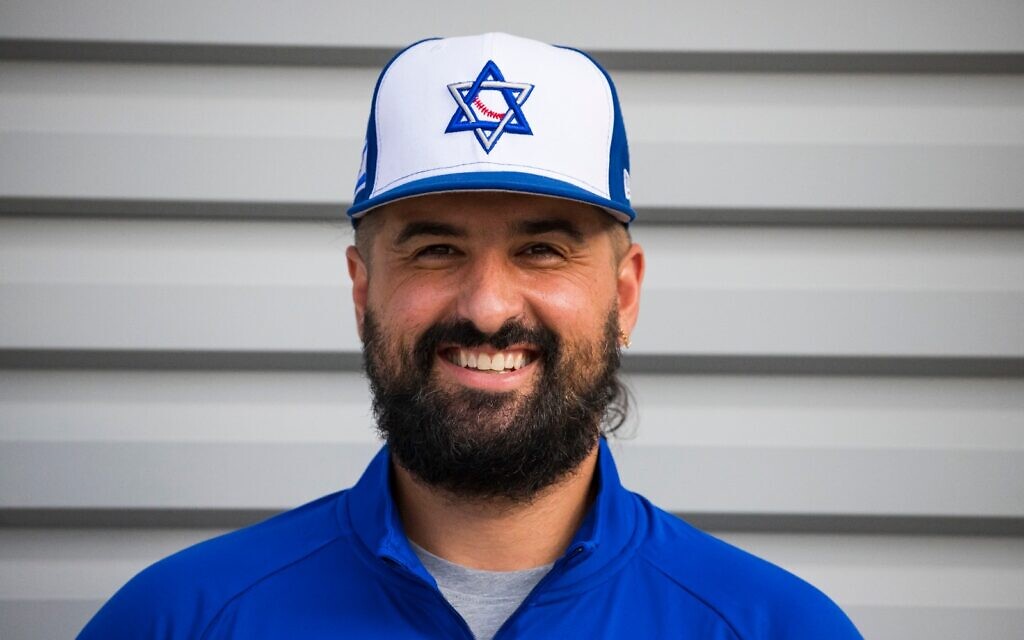
Team Israel coach Nate Fish. (Courtesy IAB)
Fish struck a successful balance when one month after the Olympics he managed Team Israel to a second-place finish in the European championships with a mixed team including Olympians but featuring mostly homegrown talent.
With only 800 players and a small baseball academy, it’s very difficult to imagine Israel fielding a competitive team of Israeli-born players at the Olympics or WBC.
But, Alter points out, “It was hard to imagine Israel playing in the Olympics, and yet it happened. The development of world-level Israeli players is already underway.”


